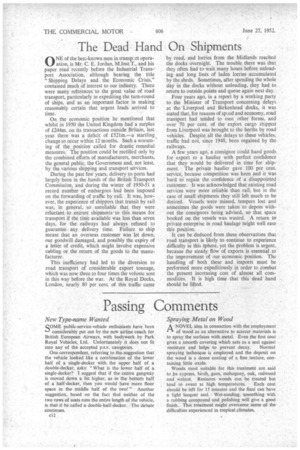The Dead Hand On Shipments
Page 50

If you've noticed an error in this article please click here to report it so we can fix it.
0 NE of the best-known men in transport operaation, is Mr. C. E. Jordan, M.Inst.T., and his paper read recently before the Industrial Transport Association, although bearing the title "Shipping Delays and the Economic Crisis," contained much of interest to our industry. There were many references to the great value of road transport, particularly in expediting the turn-round of ships, and as an important factor in making reasonably certain that urgent loads arrived to time.
On the economic position he mentioned that whilst in 1950 the United Kingdom had a surplus of £244m. on its transactions outside Britain, last year there was a deficit of £521m.—a startling change to occur within 12 months. Such a worsening of the position called for drastic remedial measures. The position could be rectified only by the combined efforts of manufacturers, merchants, the general public, the Government and, not least, by the various shipping and transport services.
During the past few years, deliveryto ports had largely been in the hands of the British Transport Commission, and during the winter of 1950-51 a record number of embargoes had been imposed on the forwarding of traffic by rail. It was, however, the experience of shippers that transit by rail was, in general, so unreliable that they were reluctant to entrust shipments 'to this means for transport if the time available was less than seven days, for the railways had always refused to guarantee any delivery time. Failure to ship meant that an overseas customer was let down, our goodwill damaged, and possibly the expiry of a letter of credit, which might involve expensive cabling or the return of the goods to the manufacturer.
This inefficiency had led to the diversion to road transport of considerable export tonnage, which was now three to four times the volume sent in this way before the war. At the Royal Docks, London, nearly 80 per cent. of this traffic came by road, and lorries from the Midlands reached the docks overnight. The trouble there was that they often had to wait many hours before unloading and long lines of laden lorries accumulated by the sheds. Sometimes, after spending the whole day in the docks without unloading, they had to return to outside points and queue again next day.
Four years ago, in a report by a working party to the Minister of Transport concerning delays at the Liverpool and Birkenhead docks, it was stated that, for reasons of spxd and economy, road transport had tended to oust other forms, and over 70 per cent. of the export cargo shipped from Liverpool was brought to the berths by road vehicles. Despite all the delays to these vehicles, traffic had not, since 1948, been regained by the railways.
A few years ago, a consignor could hand goods for export to a haulier with perfect confidence that they would be delivered in time for shipment. The private haulier gave 100 per cent. service, because competition was keen and it was hard to regain the confidence of a disappointed customer. It was acknowledged that existing road services were more reliable than rail, but in the case of small shipments they still left much to be desired. Vessels were missed, tempers lost and sometimes the goods were taken to depots without the consignors being advised, so that space booked on the vessels was wasted. A return to private enterprise in road haulage might well ease this position.
It can be deduced from these observations that road transport is likely to continue to experience difficulty in this sphere, yet the problem is urgent, because the steady flow of exports is essential to the improvement of our economic position. The handling of both these and imports must be performed more expeditiously in order to combat the present increasing cost of almost all commodities. It is high time that this dead hand should be lifted.
















































































































































